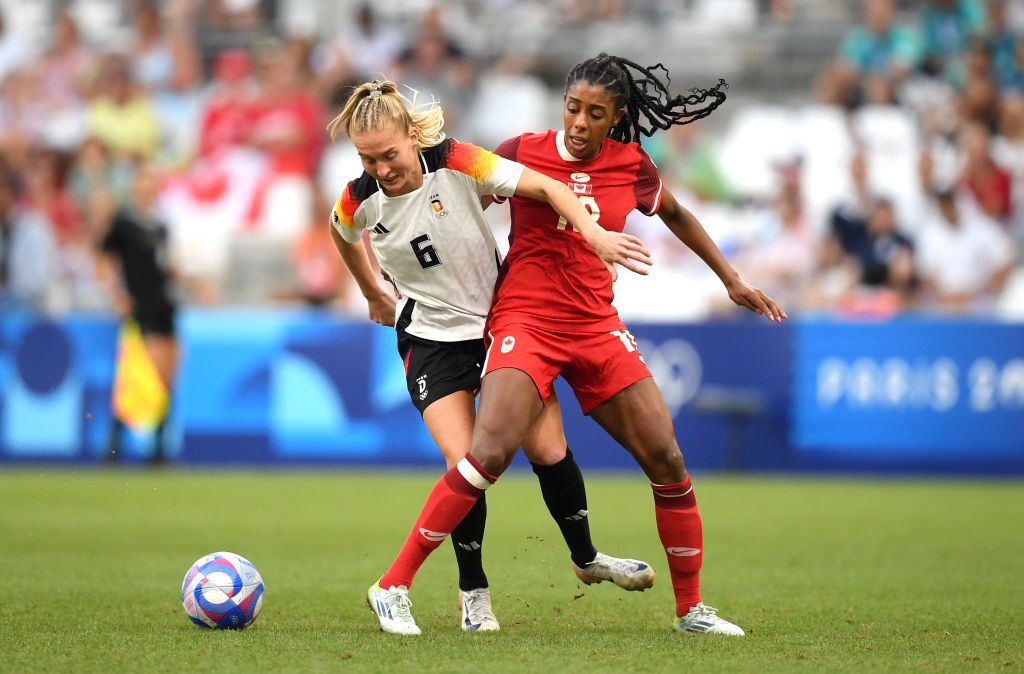GANGUE-RUZIC: Why the CanWNT's Olympic elimination could spark a generational shift in their attack

The CanWNT’s Olympic journey is over, as they fell to Germany on penalties in the quarter-finals this past weekend.
As a result, their streak of three straight Olympics with medals has come to an end after they claimed back-to-back bronze medals in 2012 and 2016, before winning gold in 2021.
After a remarkable group stage performance, where they won all three games to get out of their group despite earning a six-point deduction, it was an unfortunate end to what was looking to be a promising tournament for this Canadian team.
Despite that, they have a lot to be proud of. Having essentially played four knockout stage games from their opener onwards, as they needed to win all three of their group stage matches to get out of their group, they just seemed to run out of gas by the end of their quarter-final.
At the same time, that won’t lessen the pain of defeat, as Canada still had plenty of chances to win their quarter-final. After a strong German start in the first half, Canada turned it up in the second half, and looked to be the likelier team to win for the rest of the game and into extra time, at least in open play (Germany did have a few dangerous set-piece opportunities late in regular time, though).
Ultimately, however, they couldn’t find the crucial goal they needed to break open the game. After scoring five goals in three group-stage games, they couldn’t find the net when it mattered most, despite doing what they needed to do defensively to win.
The #CanWNT/#CanXNT and Germany are having a "anything you can do, I can do better" competition, but for missed chances
— Alexandre Gangué-Ruzic (@AlexGangueRuzic) August 3, 2024
How has no one scored yet
With that, a key question that has persisted for the past couple of years came to the forefront once again - has Canada found a way to replace the goalscoring of Christine Sinclair, the all-time leading international scorer who recently retired from the Canadian team after over two decades with the squad?
No doubt, this Canadian team has more than replaced her overall goalscoring output - in their past 18 games before this Germany match, they’d been kept off the scoresheet just once, coming in a friendly against Brazil in Montréal last October. Over that span of 18 games, they’d scored 39 goals, too, and while their total was inflated from some high-scoring games against lower-ranked teams, they’d also scored against the likes of the US, Brazil, Australia and France, which are all top sides.
The bigger question, however, was if they could replace Sinclair’s ability to step up in the biggest moments, as she had a knack for stepping up with key goals in big games for this Canadian team. In a knockout match, where the margins can be so slim, having players who can step up and find clutch goals can be massive.
For what it’s worth, heading into this Germany clash Canada looked to have a few names they were hoping to lean on. Canada’s hero on their gold medal run, Jessie Fleming, was a big one, having come off a massive group stage performance, while Adriana Leon was looking to continue a strong 2024 for Canada after a quiet group stage showing. Heck, one could also wonder if Vanessa Gilles had more magic in her pocket, too, given that the Canadian centre back had scored two game-winning goals in the group stages.
Unfortunately, however, neither of those three were able to find that magic against Germany, albeit for different reasons.
23 shots from Canada. They can be proud of their effort, but those missed chances came back to haunt them. pic.twitter.com/bQF5N8mL0b
— Meaghen Johnson (@MeaghenJohnson) August 3, 2024
Fleming ended up only making it until half time before getting taken out with a suspected head injury, which was a massive blow for her side given her importance, while Gilles had just one shot, a looping header off the second phase of a set-piece that sailed just over the crossbar, as she (understandably) wasn’t able to get many looks offensively as a centre back.
Meanwhile, Leon was the most active offensively, finishing with five shots, including a breakaway and a couple of dangerous shots from inside of the box, but she was unable to find the net on any of them.
As a result, Canada went 120 minutes without finding the net against Germany, leading them to the penalty shootout, where they eventually fell.
Because of that, they’ve now gone five straight knockout games at the Olympics and World Cup without scoring a non-penalty goal, having scored twice from penalties (both from Fleming in Tokyo) across that span. What that means is the last Canadian to score a non-penalty goal in a knockout game at the Olympics or a World Cup is Sinclair herself, who scored what stood as the winner in the bronze medal match of the 2016 Olympics.
And that highlights why Canada’s big quest after Sinclair’s retirement now has to be to figure out who they’ll want to lean on offensively at the next major tournament, which will be at the 2027 World Cup.
Given that key offensive pieces from this Olympic squad such as Leon, Cloé Lacasse, Nichelle Prince and Janine Beckie will be all between the ages of 32 and 34 at that next tournament, it feels like a generational shift could be soon underway offensively, as a couple of those names might naturally fall out of the picture as they get older. 
And with other attacking options such as Evelyne Viens sitting in the prime of her career at 27, and several other attackers currently 25 or younger such as Deanne Rose (25), Jordyn Huitema (23), Clarissa Larisey (25) and Olivia Smith (20), it feels like several of those names could step up in a big way over the next few years and will push their way into bigger roles.
Plus, there could be youngsters who are yet to be discovered, too, as young attackers can often come out of nowhere. Especially with the impending launch of the Northern Super League, which will give opportunities to Canadian players to play professionally at home, and that could open the door for some young attackers to emerge.
Because of that, it feels like this could be the start of a generational shift for this Canadian attack. With three years until that next World Cup, that’ll give plenty of time for players to make progress at the club level and use that experience to carve out bigger roles for the National Team, without having to worry about breaking into the squad for a major tournament, as that’s been the case for three of the last four years.
Within that, the goal will be to find names who can step up so that if Canada reaches a knockout game at the 2027 World Cup, they can throw out a familiar attacking group they can rely on, knowing that they’ll find a way to step up and get those elusive knockout stage goals.
Instead of what they had to do at these Olympics, where they used three different combinations of attackers across their four games, that’ll make a big difference.
Just look at the US these Olympics, who has transitioned from a generational of dangerous offensive makers such as Alex Morgan, Megan Rapinoe, Tobin Heath, Christen Press, Carli Lloyd and many more to a trio of Sophia Smith, Trinity Rodman and Mallory Swanson, who have each scored three goals on the US’s road to the Olympic final. Every game, the US knows that they’ll be able to throw out Smith, Rodman and Swanson and that trio will score them goals, and that’s made a huge difference for them in big games.
By comparison, Canada was unable to find that same cohesion with their attack, making it hard to predict who they might try together offensively when it came to the Germany game. That ended up having a big effect on them in many ways, such as their struggles to start games strongly and ultimately had its biggest impact when it came to their do-or-die quarter-final clash.
Therefore, keep an eye on them to start evolving that offensive group, starting with their next window, where the likes of Viens, Smith, Huitema, Larisey and Rose could all feature prominently, especially if they find form with their respective clubs.
This team can create chances and score goals, shown by the fact that they generated an average of 2.02 xG on 14.75 shots (per WyScout) this tournament, with the Germany game (2.83 xG on 21 shots) being their best showing in the chance department, but they were unable to find the magic needed in the key moments.
Armed with a strong group of centre backs and a goalkeeper ranked among the best in the world, a solid midfield and good wing backs, the spine is there for this Canadian team, which is why they were so close to another top-four finish at the Olympics, but they’ll know that finding the right offensive balance will be key for them to take the next step as a group.
And the journey starts now for them in that regard, as whoever is in charge when Canada plays their next game will have a lot of work to do to find that right mix offensively.

